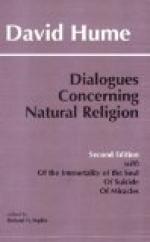|
This section contains 8,637 words (approx. 29 pages at 300 words per page) |

|
SOURCE: “Philosophy as Literature: The Case of Hume's Dialogues,” in Compendious Conversations: The Method of Dialogue in the Early Enlightenment, edited by Kevin L. Cope, Peter Lang, 1992, pp. 34-53.
In this essay, Wadia attempts to correct traditional criticisms of the Dialogues Concerning Natural Religion by viewing its theological doctrines against the backdrop of its dialogue form.
In a well-known passage toward the close of Book I of his A Treatise of Human Nature,1 David Hume tells us how, when he reflects on “the condition of the learned world, which lies under such a deplorable ignorance” of the fundamental principles of philosophical learning, “I feel an ambition to arise in me of contributing to the instruction of mankind, and the acquiring a name by my inventions and discoveries.”2 The cultivation of a proper style in which to communicate his “inventions and discoveries” was one of Hume's life-long preoccupations but...
|
This section contains 8,637 words (approx. 29 pages at 300 words per page) |

|


